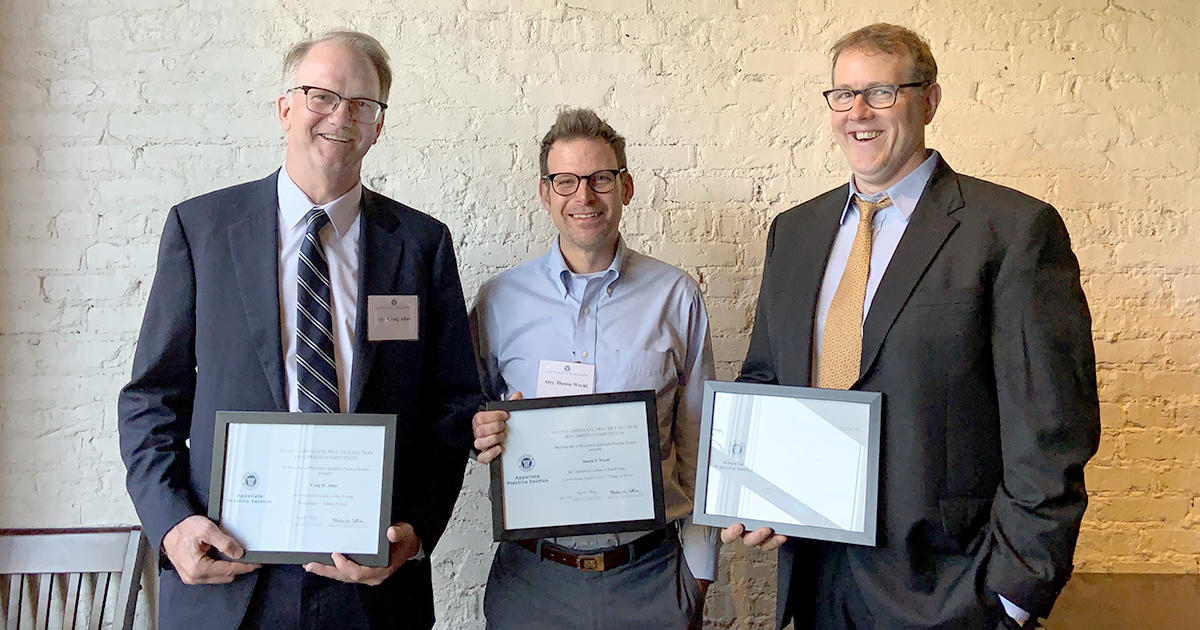
Dec. 21, 2022 – Wisconsin’s legal community did its best to return to a pre-pandemic normal in 2022.
Judges and lawyers made progress in reducing a statewide backlog of criminal cases, while trying to work out whether virtual hearings, a necessity during the darkest days of the pandemic, were appropriate for all types of court proceedings.
As in 2021, state and federal appellate courts handed down decisions on political disputes between the branches of state government and pandemic-related public health measures. But most attorneys spent their time handling more quotidian ‘nuts-and-bolts’ issues.
Of course, State Bar of Wisconsin members continued to mark career milestones, bestow and accept awards, and volunteer with the State Bar’s 26 sections and 20 committees.
We look back on 2022 by highlighting some of the State Bar’s top articles, in no particular order. The articles appearing in Wisconsin Lawyer™, WisBar InsideTrack™, and State Bar section blogs.
We’ve again included entries from WisLawNOW, the State Bar’s blog portal/aggregator. Legal blogs play an ever-increasing role in both the spread of legal knowledge and lawyer marketing. This year’s entries feature some great writing by State Bar members.
The Top 24 Articles of 2022

1. Jim Shellow and the Importance of Mentorship (WL, April)
Wisconsin Lawyer author Joseph A. Bugni paid tribute to the role that mentoring played in the extraordinary career of Milwaukee criminal defense attorney Jim Shellow.
Shellow, who passed away this year at age 95, was a past president of the National Association of Criminal Defense Lawyers. He practiced for nearly 60 years.
Along the way, Bugni wrote, Shellow mentored dozens of young lawyers, helping them to great leaps forward in their trial skills.
“In its truest and best form, mentoring helps the student to see the beauty of the attorney’s craft – revealing what excellent lawyering looks like and how rewarding it can be.”
2. Who Leaked the U.S. Supreme Court’s Draft Opinion? (Appellate Practice Section Blog, June)
Jacques Condon and Nicholas Zales discussed the unprecedented leak of the draft of the U.S. Supreme Court’s decision in Dobbs v. Jackson Women’s Health Organization in a blog post.
The draft opinion, which was leaked to Politico in May, differed little from the opinion that the Court released one month later. In Dobbs, the Supreme Court by a 6-3 vote struck down Roe v. Wade, the landmark 1973 decision in favor of abortion rights,
“I initially guessed the leak was probably unintentional – but this may be more hopeful than actual, and I can be persuaded otherwise,” Condon wrote.
There is no way the leak of Justice Samuel Alito's draft opinion … was an accident or oversight,” Zales responded. “It was intentional. The Court likely has an internal and external email systems … Politico would have needed to obtain a draft outside that closed system. All it takes is an email.”

3. Navigating Wisconsin’s New LLC Act (WL, June)
Adam Tutaj provided a thorough overview of Wisconsin’s new LLC law in the June issue of Wisconsin Lawyer.
By passing the new law in April, Tutaj wrote, the legislature adopted the most recent version of the Revised Uniform Limited Liability Company Act (RULLCA) and replaced the state’s original “home-brewed” LLC law.
“With the New LLC Act, Wisconsin joins the 23 other states that have already adopted a version of RULLCA’s ‘second-generation’ LLC statute – and Wisconsin businesses stand to gain enormous benefits from the uniformity this brings.”
4. ‘It’s Hard to See That We’re Still Struggling’ – Task Force Report on Wisconsin Lawyer Well-being (WL, July)
A report on lawyer well-being issued by the Task Force on Wisconsin Lawyer Well-being in December 2021 formed the basis for this Wisconsin Lawyer cover story.
The report contains 72 recommendations designed to help lawyers maintain well-being across all dimensions of their lives – emotional, occupational, intellectual, spiritual, physical, and social.
Peter Carman, an Appleton attorney who was interviewed for the article, said it was stigma that kept him from seeking help for his depression.
“I didn’t want anyone in the law to know what I was struggling with, in part because I’d let someone in law know previously and I ended up getting laid off,” Carman said. “It didn’t help me any.”

5. Immigration Law Should Be Updated to Better Protect Climate Refugees (Environmental Law Section Blog, August)
In this blog post, Sarah Cannon noted that U.S. immigration law does not automatically accord refugee status to people displaced from their native countries by climate change.
“The existing legal framework does not support the increasing numbers of climate refugees,” Cannon wrote. “As climate disasters increase in frequency and intensity, clarifying and expanding the legal protection for climate refugees is more imperative than ever.”
6. Law School Loans: Avenues for Debt Relief (IT, September)
The growing student loan debt crisis and efforts to address it were the subject of this article co-written by Karen Bauer, an attorney with the Legal Aid Society of Milwaukee, and Jeff M. Brown, the State Bar’s legal writer.
Bauer discussed an executive order issued by President Joe Biden that would forgive up to $20,000 for certain borrowers (the order is currently being challenged). She also discussed the terms of the Public Service Loan Forgiveness program.
“Student debt is driven by more than just tuition increases,” Brown wrote. “Living expenses take up an increasing share of education costs, and the purchasing power of federal grant aid has declined significantly.”

7. Managing Stormwater in a Watershed Context (WL, May)
The Badger State’s abundance of water – it has 5 million acres of wetlands – can be a mixed blessing, wrote Paul Kent, Erin O’Brien, and Tracy Hames in the May issue of Wisconsin Lawyer.
“It requires that stormwater runoff be effectively managed from both a water quantity and a water quality standpoint. Stormwater can result in floods that damage urban property, farmland, roads, and other infrastructure. It can also damage streambanks, lakes, and wetlands through erosion and sediment deposit”
The article was part of a multiple-issue Water Law Series in 2022.
8. What ‘Caddyshack’ Taught Me About Practicing Law (Nonresident Lawyers Blog, June)
In this blog post, Nonresident Lawyers Division member Daniel Rislove shared several lawyering lessons that he’d learned from the 1980 comedy film ‘Caddyshack.’
“‘Caddyshack’ is an almost limitless source of legal wisdom, and I take these lessons to heart in my own practice,” Rislove wrote. “In the end, it’s not just a matter of keeping your eye on the ball – you need to ‘be the ball’ that your clients want and deserve.”
9. Pro Bono Spotlight: Helping Afghan Refugees with Asylum Applications (IT, September)
Jeff L. Brown, the State Bar’s pro bono program manager, detailed volunteer efforts by State Bar members to help 900 Afghan refugees re-settle in Wisconsin.
Federal rules required the refugees to apply for asylum or an alternate immigration status within one year of entering the U.S., Brown wrote.
“Everyone quickly realized that it would take an unprecedented effort to help so many people in such a short amount of time. There are only a small number of full-time immigration attorneys and paralegals in Wisconsin, not enough to handle such a surge.”

10. Addressing Retention: Steps to Keep Women in Law Firm Positions (Business Law Section Blog, January)
Despite advances in gender equality, the legal profession still has work to do when it comes to supporting women attorneys in law firms, wrote law student Kelly Gorman.
Gorman discussed an American Bar Association report on the long-term careers for women attorneys.
“Flexibility in working hours includes offering part-time alternatives that still allow for upward mobility and opportunities to work remotely,” Gorman wrote.
“Flexibility in working hours might also mean changing the misconception that reduced hours or different work settings mean less quality work.”
11. The Post-Dobbs Workplace: How Wisconsin’s Lack of Abortion Access Impacts Employment (Labor and Employment Law Section Blog, August)
In a blog post written after the U.S. Supreme Court handed down the Dobbs decision and overturned Roe v. Wade, Emma Ferguson explored how the lack of access to abortion services would affect Wisconsin employers and their female employees.
“In revealing to their employer a plan to get an abortion, an employee gives their employer pregnancy-related information that the employer otherwise would not have had and could use to discriminate against them,” Ferguson wrote. “That employee may incidentally reveal further sensitive information about themselves.”
12. We Need to Recognize the Implicit Bias in Wisconsin’s Youth Justice System (Children and the Law Section Blog, November)
Alaina Fahley, a criminal defense attorney who practices in northern Wisconsin, argued that the court system should take into account the effects of implicit bias, as well as the effect of racial trauma has on children of color.
“Research supports this experience: children of color throughout the country and specifically in Wisconsin experience contacts with police, juvenile intake, and juvenile courts at a higher rate than their white peers,” Fahley wrote.
“It is in the interest of all justice stakeholders to recognize this disproportionality and to take steps to make the juvenile justice system more just for all children.”

13. Short-term Rentals: As a Vacation Hub, Wisconsin Navigates the Laws of Leisure (IT, May)
This article explored the responses of Wisconsin courts to lawsuits filed over the use of short-term rentals in the state. The article also discussed a state law enacted in 2017 that limits the ability of municipalities to restrict short-term rentals.
“Communities are figuring out ways to adopt regulations which maybe aren’t satisfying to everyone, but it is quieter,” Curt Witynski, deputy executive director for the League of Wisconsin Municipalities, noted in the article.
14. Tip of the Month: Disclosing Invisible Disabilities on IDs Can Increase Safety (Public Interest Law Section Blog, September)
In this blog post, Christine Huberty explained that persons with invisible disabilities, like diabetes or deafness, may now designate such a disability on their driver’s license, identification card, or vehicle registration.
“The goal, according to the Invisible Disabilities Association, is to help alert law enforcement and first responders to a person’s nonobvious disabilities that could be misunderstood during a traffic stop or other routine contact,” Huberty wrote.
15. Wisconsin Supreme Court: Original Actions (WL, October)
Appellate litigator Colin Roth explored the increase in the number of petitions for original actions filed with – and granted by – by the Wisconsin Supreme Court in this Wisconsin Lawyer article.
Public health measures enacted during the pandemic have been the largest driver in the increase, Roth explained. In one case, the supreme court issued an order on the same day that it accepted an original action.
“If litigants hadn’t yet gotten the message, they certainly did now: If you’re unhappy with pandemic response measures, file an original action petition and ask for an injunction,” Roth wrote.

16. Finding and Developing our Future Trial Attorneys (Litigation Section Blog, June)
In this blog post, Heather Nelson wrote that despite the perception that jury trials are largely a thing of the past, “there remains a need for competent trial attorneys and [there] likely always will.”
After describing her first trial, Nelson offered suggestions for training trial attorneys.
“We didn’t come out of law school with great trial skills,” Nelson wrote. “We had people to show us how to do it (and in some cases how not to do it). It is up to us to develop our future trial attorneys. But how?”
17. On the Road Again: OWI Law and Electric Bikes and Scooters (IT, August)
Electronic bikes and scooters are more popular than ever. Though foolish and risky both to the driver and the public, wrote Peter Heyne, “riding an electric bike or scooter on a public road while under the influence does not appear to violate Wisconsin OWI laws.”
“Standard OWI laws apply to some types of self-propelled vehicles, like motor bicycles and riding lawn mowers, but electric bicycles or electric scooters appear exempt. Other rules of the road apply, so those who drive these popular and more eco-friendly vehicles should still drive carefully.”
Write: Become an Influencer in the Legal Community
Raise your profile, advance your career, and share your expertise with other legal professionals by writing for the State Bar.
Start here
18. As I See It: Water Law in Native Nation Territories (WL, October)
University of Wisconsin Law School Professor Richard Monette discussed the complex area of Indian water rights and explored recent developments in this Wisconsin Lawyer article, part of a multi-issue Water Law Series in 2022.
“Like [the state], tribes may have a public trust doctrine or a police power doctrine to strike the balance between collective interests and individual private property in their territories,” Monette wrote. “The challenge will be whether stakeholders will recognize this basic right of self-determination in the tribes as well.”
19. Alternative Ways to Resolve Child Custody Disputes During the Pandemic (Family Law Section Blog, May)
Public health measures enacted during the pandemic posed challenges for judges, family law practitioners, and clients, wrote Tiara Oates.
“Judges are finding it difficult to balance the needs of families during this challenging moment in time. Not only are judges trying to weigh the best interests of all parties involved, but they also have to determine the safest outcome for any affected minor.”

20. Rewrite ‘Until it Sings’: Tips from Best Briefs Competition (IT, June)
Appellate litigator Joseph Diedrich collected tips from the four winners of the annual Appellate Section’s Best Briefs Competition.
“A finely tuned and powerfully written appellate brief teaches many lessons, and appellate attorneys are always striving to improve their written argumentation skills,” Diedrich wrote.
21. Arrest and Conviction Record Discrimination Law in Wisconsin (WL, September)
A recent 4-3 decision by the Wisconsin Supreme Court “significantly expands employers’ discretion to consider information about an employee’s conviction record,” wrote Storm Larson.
“The full effect of this decision is yet to be determined, and application of the decision by courts and administrative agencies will provide further guidance to both employees and employers,” Larson wrote.
“What is clear now is that employers have more leeway to consider information about an individual’s prior criminal conviction history in making a determination about fitness for employment.”
22. Municipal Courts: Justice Delivered Locally (Criminal Section Law Blog, March)
Dane County Court Commissioner Jason Hanson explained the ins and outs of municipal court proceedings in this blog post.
“In many ways, municipal court practice is similar to that in circuit court for non-criminal traffic and forfeiture offenses … a trial must be held in order to preserve appeals of suppression decisions, though these trials may be on stipulated facts,” Hanson wrote.
23. As I See It: Standardizing Wisconsin Motion Practice – and Calendaring in General (WL, November)
The lack of a standard motion practice procedure for Wisconsin’s circuit courts came in for criticism in this Wisconsin Lawyer article by Ryan Simatic.
“Rather than relying on standardized procedural rules, lawyers must guess which deadlines, if any, apply for responses,” Simatic wrote.
“For example, most counties do not have rules dictating whether a reply brief is permitted or whether a proposed order is required at the time the motion is submitted or after it is heard.”

24. Federal Funding and Wisconsin’s Water Infrastructure (WL, December)
The last in a 2022 Water Law Series, Professor Melissa Scanlan and Misbah Hussain explained issues and disparities in managing the state’s water infrustructure.
“Wisconsinites are at increased risk for diminished drinking water quality, extreme flooding, property damage, and more,” Scanlan and Hussain wrote.
“Moreover, these negative consequences are unequally distributed, with low-income and minority communities disproportionately affected by such harms.”
Best of WisLawNOW 2022
In 2020, the State Bar of Wisconsin launched a new online community for Wisconsin legal bloggers. Called WisLawNOW, this community gathers blog content written by State Bar of Wisconsin members on a single website.
Sixty-nine blogs have joined WisLawNOW, to extend their reach, showcase their expertise, and add to the State Bar’s digital collection of legal knowledge. Here are the 10 most-read articles posted in 2022:
U.S. Department of Commerce Implements Sanctions Against Russia (Erica D. Kolo, Reinhart Boerner Van Deuren S.C.)
New Statute to Replace Chapter 183 for Wisconsin LLCs (Danielle M. Johnson, Reinhart Boerner Van Deuren S.C.)
Phone and Email Scams to Watch Out for During Tax Season (Christopher M. Hayden, Gimbel, Reilly, Guerin & Brown)
When to Hold On, and When to Logo (Sam Kavalier, Ogden Glazer + Schaefer)
What the heck … I mean you all saw that, right? (Stacie Rosenzweig, Ethicking)
The Wisconsin Disciplinary Winds May Be Shifting (Stacie Rosenzweig, Ethicking)
SCOTUS Rejects “Door Opening” as Confrontation Clause Exception (Wisconsin State Public Defender, On Point)
Who CARES? – Status on the Coronavirus Aid, Relief, and Economic Security Act (Gary D. Koch, Tristan’s Landlord-Tenant Law Blog)
Court of Appeals Rejects Challenges to Denial of Suppression in OWI Case (Wisconsin State Public Defender, On Point)
The Wage and Hour Implications of the Infrastructure Investment and Jobs Act (Joe Andreoni, Kramer, Elkins & Watt LLC)
